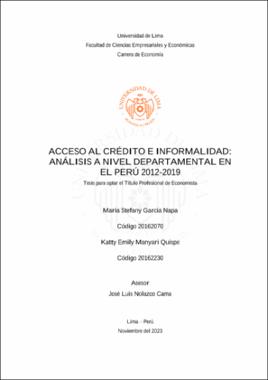Acceso al crédito e informalidad: análisis a nivel departamental en el Perú 2012-2019

Ver/
Tesis
(application/pdf: 1003.Kb)
(application/pdf: 1003.Kb)
Autorización
(application/pdf: 338.8Kb)
(application/pdf: 338.8Kb)
Reporte de similitud
(application/pdf: 11.12Mb)
(application/pdf: 11.12Mb)
Fecha
2023Asesor(es)
Metadatos
Mostrar el registro completo del ítemResumen
The present study aims to evaluate the direct incidence of access to credit on the levels of informality in the departments of Peru during the period 2012-2019. To do this, the informality rate is used, measured by the "informal situation" variable from the ENAHO "Employment" module, and access to credit, which has financial deepening as a proxy and is measured by the total ratio of direct loans divided by the total GDP by department. Regressions were performed on a panel data model specifying fixed effects. The results indicate that there is a negative effect of 0.12 percentage points in the relationship between access to credit and informality in the departments of Peru. This finding evidenced the heterogeneity of the country’s regions on the variability of access to credit. The econometrics estimation includes regional control variables related to age, superior education, agricultural sector, poverty, company size, independent working women and level of government management. The level of age and government management, as well as the agricultural sector, would not be related to informality, which is a finding contrary to the literature. El presente estudio tiene como objetivo evaluar la incidencia directa del acceso al crédito sobre los niveles de informalidad en los departamentos del Perú durante el periodo 2012-2019. Para ello, se utiliza la tasa de informalidad, medida por la variable "situación de informalidad" del módulo "Empleo" de la ENAHO, y el acceso al crédito, que tiene como proxy a la profundización financiera y es medida por la razón total de créditos directos divididos por el total de PBI por departamento. Se realizaron las regresiones en un modelo de datos de panel con especificación de efectos fijos. Los resultados indican que existe un efecto negativo de 0.12 puntos porcentuales en la relación entre el acceso al crédito y la informalidad en los departamentos del Perú. Este hallazgo evidenció la heterogeneidad de las regiones del país sobre la variabilidad del acceso al crédito. Las estimaciones econométricas incluyen variables de control regional relacionadas con la edad, educación superior, sector agrícola, pobreza, tamaño de empresa, trabajadoras independientes y nivel de gestión de gobierno. El nivel de edad y de gestión de gobierno, así como el sector agrícola, no estarían relacionados con la informalidad, lo que es un hallazgo contrario a la literatura.
Cómo citar
Garcia Napa, M. S. & Manyari Quispe, K. E. (2023). Acceso al crédito e informalidad: análisis a nivel departamental en el Perú 2012-2019. [Tesis para optar el Título Profesional de Economista, Universidad de Lima]. Repositorio Institucional de la Universidad de Lima. https://hdl.handle.net/20.500.12724/19699Editor
Universidad de LimaTemas
Coleccion(es)
- Tesis [141]

